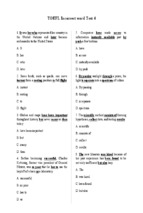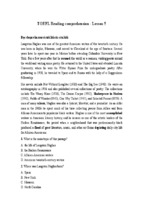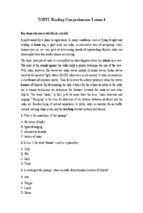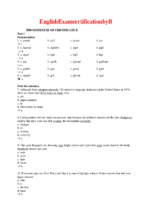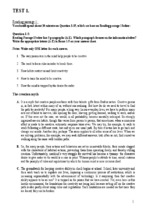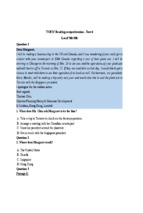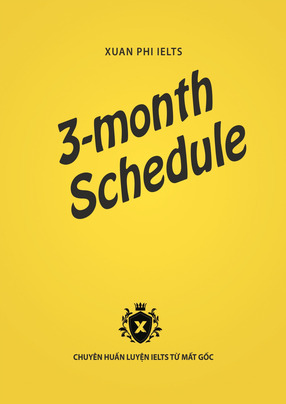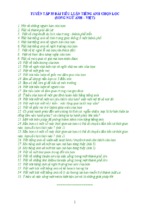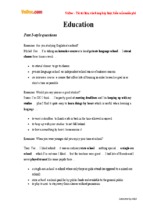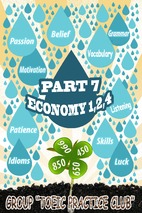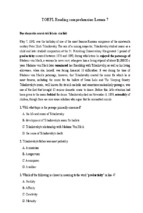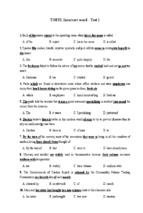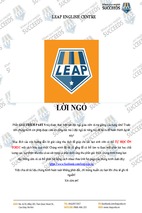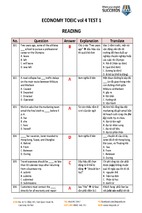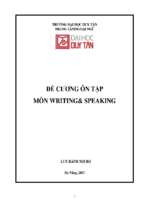Business
Vocabulary
Bill Muscull
Business
Vocabulary
in Use
CAMBRIDGE
UNIVERSITY PRESS
PUBLISHED BY T H E PRESS SYNDICATE OF T H E UNIVERSITY O F C A M B R I D G E
The Pitt Building, Trumpington Street, Cambridge, United Kingdom
CAMBRIDGE UNIVERSITY PRESS
The Edinburgh Building, Cambridge CB2 2RU, UK
40 West 20th Street, New York, NY 100114211, USA
477 Williamstown Road, Port Melbourne, VIC 3207, Australia
Ruiz de Alarc6n 13, 28014 Madrid, Spain
Dock House, The Waterfront, Cape Town 8001, South Africa
O Cambridge University Press 2002
This book is in copyright. Subject to statutory exception
and to the provisions of relevant collective licensing agreements,
no reproduction of any part may take place without
the written permission of Cambridge University Press.
First published 2002
Second printing 2002
Third printing 2002
Printed in Italy by G. Canale & C.
Typeface Sabon 10113pt. System QuarkXPressB [GECKO
LID]
A catalogue record for this book is available from the British Library
ISBN 0 521 77529 9
Contents
INTRODUCTION
JOBS, PEOPLE AND
ORGANIZATIONS
0 Work and jobs
A What do you do?
B Word combinations with 'work'
C Types of job and types of work
a
A Health and safety
B Bullying and harassment
C Discrimination
a
Recruitment and selection
A Recruitment
B Applying for a job
C Selection procedures
Skills and qualifications
A Education and training
B Skilled and unskilled
C The right person
Pay and benefits
A Wages, salary and benefits
B Compensation 1
C Compensation 2
People and workplaces
A Employees and management
B Management and administration
C Labour
D Personnel and human resources
0 The career ladder
A A job for life
B A job for now
C In-house staff or freelancers?
D Losing your job
Managers, executives
and directors
A Managers and executives: UK
B Managers and executives: US
Businesspeople and
business leaders
Ways o f working
A Old and new ways
B Nice work if you can get it
C Nature of work
a
Problems at work
A Businesspeople and entrepreneurs
B Leaders and leadership
C Magnates, moguls and tycoons
m Organizations 1
A Business and businesses
B Commerce
C Enterprise
D Word combinations with 'enterprise'
Organizations 2
A
B
C
D
Self-employed people and
Limited liability
Mutuals
Non-profit organizations
PRODUCTION
Manufacturing and services
A Industry
B Manufacturing and services
C Countries and their industries
mThe development process
A Market research
B Development and launch
Business Vocabulary in Use
Innovation and invention
38
A Innovation and invention
B Research and technology
C Patents and intellectual property
(g Making things
40
44
A Advertising
B The sales force
C Promotional activities
The Internet and
e-commerce
46
4
Business Vocabulary in Use
A The Internet
B Clicks-and-mortar
C B2B, B2C and B2G
MONEY
48
A Companies and markets
B More word combinations with 'market'
C Competitors and competition
A Marketing
B The four Ps
C Market orientation
A Distribution: wholesalers, retailers
and customers
B Shops
C Direct marketing
Promotion
A Customers and clients
B Buyers and sellers
C The market
D Word combinations with 'market'
Marketing and market
orientation
Price
Place
MARKETING
Markets and competitors
a
42
A Total quality management
B Continuous improvement
C Benchmarking
D Business process re-engineering
Buyers, sellers and
the market
52
A Pricing
B Word combinations with 'price'
C Upmarket and downmarket
D Mass markets and niches
A Inputs
B Suppliers and outsourcing
C Just-in-time
Business philosophies
Products and brands
A Word combinations with 'product'
B Goods
C Brands and branding
A Products
B Mass production
C Capacity and output
Materials and suppliers
a
Sales and costs
A Sales 1
B Sales 2
C Costs
D Margins and mark-ups
50
Profitability and
unprofitability
A Profitable and unprofitable products
B Budgets and expenditure
C Economies of scale and the learning
curve
64
Getting paid
Financial centres
66
A
B
C
D
A Shipping and billing
B Trade credit
C Accounts
Assets, liabilities and the
balance sheet
A
B
C
D
68
A Market indexes
B Market activity: good times ...
C ... and bad times
Assets
Depreciation
Liabilities
Balance sheet
The bottom line
a
70
72
EE) Indicators 2
A Capital
B Share capital
C Loan capital
D Security
E Leverage
Success and failure
A
B
C
D
A
B
C
D
74
a
76
88
Ethics
A Code of ethics
B Ethical standards
C Ethical investment
1
FINANCE AND THE ECONOMY
A Traditional banking
B New ways of banking
C Personal investing
Wrongdoing and corruption
A Wrongdoing
B Bribery and corruption
C Fraud and embezzlement
A Stakes and joint ventures
B Mergers and takeovers
C Conglomerates
Personal finance
Going up
Going down
Peaks and troughs
Boom and bust
DOING THE RIGHT THING
Cash mountains and surpluses
Debt and debt problems
Turnarounds and bailouts
Bankruptcy
Mergers, takeovers and
sel I-offs
Indicators 1
A Finance and economics
B Inflation and unemployment
C Trade
D Growth and GDP
A Accounts
B Results
Share capital and debt
Financial centres
Stock markets
Other financial markets
Derivatives
78
PERSONAL SKILLS
Time and time management
92
A Timeframes and schedules
B Projects and project management
C Time tips
Business Vocabulary in Use
5
Stress and stress
management
94
A When work is stimulating
B When stimulation turns to stress
C Downshifting
Leadership and
management styles
98
100
A Names
B Business cards
C Dress
102
10 4
A Phoning scenario
B Asking to speak to someone 1
C Voicemail
6
Business Vocabulary in Use
A Email
B Email expressions
C Email abbreviations
BUSINESS SKILLS
116
m chairperson
Meetings 2: the role of the
11 8
A Before the meeting
I3 During the meeting
C Follow-up
A Telephones and beyond
B Phone, call and ring
C Numbers
D Doing things over the phone
Telephoning
2: getting through
A Sending faxes
I3 Fax layout
C Receiving faxes
A Word combinations with 'meeting'
B Types of meeting
C How was the meeting?
TELEPHONE, FAX AND EMAlL
Telephoning
1: phones and numbers
110
Faxes
Meetings 1: types of
meeting
A Entertainment and hospitality
B Time
C Cross-cultural communication
a
Telephoning
4 : arrangements
a
A Cultures and culture
B Distance and familiarity
m Business across cultures 3
108
A Making arrangements
B Closing the conversation
C Changing arrangements
CULTURE
Business across cultures 2
Telephoning 3: messages
A Asking to speak to someone 2
B Giving and taking messages
C Spelling names
D Taking messages: checking information
96
A Leadership
I3 Modern management styles
C Empowerment
Business across cultures 1
a
a
106
Meetings 3: points of view
A Opening the meeting
B Inviting people to speak
C Making your point
120
m Meetings
4: agreement
and disagreement
Negotiations 3: furthering
negotiations
122
A
B
C
D
A Discussion without argument?
B Agreeing
C Disagreeing
Meetings 5: discussion
techniques
124
Win-win
Probing
Proposal and counter-proposal
Trade-offs
Negotiations 4: difficulties
A Hedging
B Checking understanding, interrupting,
A Confrontation
B Confrontational negotiating tactics
referring back
C Agreement, consensus or compromise?
D Concluding
C Dealing with problems
a
Negotiations 5: reaching
agreement
Presentations 1: preparation
and introduction
126
A Types of presentation
B Dos and don'ts: preparation
A
B
C
D
138
140
A Deadlock and mediators
B Agreements and contracts
C Checking the deal
Answer key
C Key phrases: introduction
Presentations 2: main part
136
128
Index
Dos and don'ts: timing
Dos and don'ts: voice
Rapport with the audience
Key phrases: main part
Presentations 3: closing
and questions
130
A Dos and don'ts: body language
B Visual aids
C Key phrases: closing and dealing with
questions
Negotiations 1: situations
and negotiators
132
A Types of negotiation
B Word combinations with 'negotiations'
C Bargaining
(g Negotiations 2: preparing
134
A Preparing to negotiate
B Negotiating scenario
C Negotiating styles
Business Vocabulary in Use
7
Who is this book for?
Business Vocabulary in Use is designed to help intermediate and upper-intermediate
learners of business English improve their business vocabulary. It is for people
studying English before they start work and for those already working who need
English in their job.
Apart from improving your business vocabulary, the book also helps you to develop
the language needed for important business communication skills.
You can use the book on your own for self-study, or with a teacher in the classroom,
one-to-one or in groups.
How is the book organised?
The book has 66 two-page units.
The first 46 of these units are thematic and look at the vocabulary of business areas such
as people, organisations, production, marketing, finance and business-related economics.
The other 20 units focus on the language of skills you need in business, such as those
for presentations, meetings, telephoning and negotiations.
The left-hand page of each unit explains new words and expressions, and the righthand page allows you to check and develop your understanding of them and how
they are used through a series of exercises.
There is cross-referencing between units to show connections between the same word
or similar words used in different contexts.
There is an answer key at the back of the book. Most of the exercises have questions
with only one correct answer. But some of the exercises, including the Over to you
activities at the end of each section (see below), are designed for writing and/or
discussion about yourself and your own organisation.
There is also an index. This lists all the new words and phrases introduced in the
book and gives the unit numbers where they appear. The index also tells you how the
words and expressions are pronounced.
The left-hand page
This page introduces new vocabulary and expressions for each thematic or skills area.
The presentation is divided into a number of sections indicated by letters: A, B, C,
etc, with simple, clear titles.
As well as explanations of vocabulary, there is information about typical word
combinations and the grammar associated with particular vocabulary, for example
the verbs that are typically used with particular nouns.
There are notes on mistakes to avoid, for example:
IYou
can't say that someone is 'a responsible'.
There are also notes about differences between British and American English.
BrE: CV; AmE: rCsumC or resume
Business Vocabulary in Use
The right-hand page
The exercises on the right-hand page give practice in using the new vocabulary and
expressions presented on the left-hand page. Sometimes the exercises concentrate on
using the words or expressions presented on the left-hand page in context. Other
exercises practise the grammatical forms of items from the left-hand page. Some units
contain diagrams to complete, or crosswords.
'Over to you' sections
An important feature of Business Vocabulary in Use is the Over to you section at the
end of each unit. There are sometimes alternative Over to you sections, for learners
who are in work and those who are not. The Over to you sections give you the
chance to put into practice the words and expressions in the unit in relation to your
own professional situation, studies or opinions.
Self-study learners can do this section as a written activity.
In the classroom, the Over to you sections can be used as the basis for discussion
with the whole class, or in small groups with a spokesperson for each group
summarising the discussion and its outcome for the class. The teacher can then get
students to look again at the exercises relating to points that have caused difficulty.
Students can follow up by using the Over to you section as a written activity, for
example as homework.
How to use the book for self-study
Find the topic you are looking by referring to the contents page or the index. Read
through the explanations on the left-hand page of the unit. Do the exercises on the
right-hand page. Check your answers in the key. If you have made some mistakes, go
back and look at the explanations and exercise again. Note down important words
and expressions in your notebook.
How to use the book in the classroom
Teachers can choose units that relate to students' particular needs and interests, for
example areas they have covered in course books, or that have come up in other
activities. Alternatively, lessons can contain a regular vocabulary slot, where students
look systematically at the vocabulary of particular thematic or skills areas.
Students can work on the units in pairs, with the teacher going round the class
assisting and advising. Teachers should get students to think about the logical
process of the exercises, pointing out why one answer is possible and others are not.
We hope you enjoy using this book.
Business Vocabulary in Use
Work and jobs
What do you do?
To find out what someone's job is you say 'What do you do?' Here, Kerstin talks about her job:
'I work for a large European car maker. I work on car design. In fact, I run the design
department and I manage a team of designers: 20 people work under me. It's very interesting.
One of my main responsibilities is to make sure that new model designs are finished on time.
I'm also in charge of design budgets.
I deal with a lot of different people in the company. I'm responsible for co-ordination between
design and production: I work with managers at our manufacturing plants.'
!
You can't say
w.
Word combinations with 'work'
If you work or have work, you have a job. But you don't say that someone has d .
Work is also the place where you do your job.
Here are some phrases with 'work':
/I
I
!
m
Hi. I'm Frank. I work in a bank in New
York City. I leave for work at 7.30 every
morning.
II go to work by train and subway.
II get to / arrive at work at about nine.
II'm usually at work till six.
r Luckily, I don't get ill very much so I'm not
often off work.
You don't say, for example,
or
\
J
'
i
The economy is gowing fast
and more people are in work
than ever before. The percentage
of people out of work has fallen
to its lowest level for 30 years.
j"
[
v.
Types of job and types of work
A full-time job is for the whole of the normal working week; a part-time job
is for less time than that.
You say that someone works full-time or part-time.
A permanent job does not finish after a fixed period; a temporary job finishes after a fixed period.
You talk about temporary work and permanent work.
10
Business Vocabulary in Use
1, I
Pierre is talking about his work. Correct what he says.
I work for a French supermarket company. (1)I work about the development of new
supermarkets. (2) In fact, I running the development department and (3) I am manage for a
team looking at the possibilities in different countries. It's very interesting. (4) One of my main
is to make sure that new supermarkets open on time. (5) I'm also charged with financial
reporting. (6) I deal a t a lot of different organizations in my work. (7) I'm responsible of
planning projects from start to finish. (8) I work closely near our foreign partners, and so I
travel a lot.
Complete the text with one of the prepositions from B opposite.
Rebecca lives in London and works in public relations. She leaves
home for work at 7.30 am. She drives (1)....................... work.
The traffic is often bad and she worries about getting
(2) .......................work late, but she usually arrives
(3) ....................... work at around nine. She finishes work
quite late, at about eight. 'Luckily, I'm never ill,' she says.
'I could never take the time (4) .......................work.'
She loves what she does and is glad to be (5) .......................
work. Some of her friends are not so lucky: they are
(6) .......................work.
Write about each person using words from C opposite, and the words in brackets.
The first one has been done for you.
1 I'm Alicia. I work in a public library in the afternoons from two until six. (Vjob)
I have a par&-&;ruejob.
2 My husband works in an office from 9 am to 5.30 pm. (heljob)
3 Our daughter works in a bank from eight till five every day. (shelwork)
4 I'm David and I work in a caf6 from 8 pm until midnight. (Vwork)
5 My wife works in local government and she can have this job for as long as she
wants it. (sheljob)
6 Our son is working on a farm for four weeks. (heljob)
7 Our daughter is working in an office for three weeks. (shelwork)
Business Vocabulary in Use
II
Ways o f working
Old and new ways
I'm an office worker in an insurance company. It's a nine-to-five job with
regular working hours. The work isn't very interesting, but I like to be able to
go home at a reasonable time.
We all have to clock in and clock out every day. In this company, even the managers
have to, which is unusual!
Note: You also say clock on and clock off.
I'm in computer programming. There's a system of flexitime in my company, which
means we can work when we want, within certain limits. We can start at any
time before eleven, and finish as early as three, as long as we do enough hours
AmE: flextime
each month. It's ideal for me as I have two young children.
I work in a car plant. I work in shifts. I may be on the
day shift one week and the night shift the next week.
It's difficult changing from one shift to another. When I
change shifts, I have problems changing to a new
routine for sleeping and eating.
:working
I'm a commercial artist in an advertising agency. I
work in a big city, but I prefer living in the country, so
I commute to work every day, like thousands of other
commuters. Working from home using a computer and
the Internet is becoming more and more popular, and
the agency is introducing this: it's called teleworkmg or
telecommuting. But I like going into the office and
working with other people around me.
Clocking in
Nice work if you can get it
All these words are used in front of 'job' and 'work':
Isatisfying, stimulating, fascinating, exciting:
the work is interesting and gives
you positive feelings.
Idull,
boring, uninteresting, unstimulating: the work is not interesting.
I
repetitive, routine: the work involves doing the same things again and again.
I
tiring, tough, hard, demanding: the work is difficult and makes you tired.
Nature o f work
My work involves ...
human contact
long hours
team work
+ -ing
solving problems
travelling a lot
dealing with customers
I2
Business Vocabulary in Use
2.1
Which person (1-5) is most likely to do each of the five things (a-e)?
1 A software designer in an Internet company. Has to be in the office.
2 An office worker in a large, traditional manufacturing company.
3 A manager in a department store in a large city. Lives in the country.
4 A construction worker on a building site where work goes on 24 hours a day.
5 A technical writer for a city computer company. Lives in the country.
a work in shifts
b work under a flexitime system
c telecommute
d commute to work
e clock on and off at the same time every day
2.2
Look at the words and expressions in B and C opposite.
Five people talk about their jobs. Match the jobs (1-5) to the people (a-e)
and put the words in brackets into the correct grammatical forms.
1 accountant
2 postwoman
3 flight attendant
4 software developer
5 teacher
a Obviously, my work involves ..................................... (travel) a lot. It can be quite
physically
..................................... (tire), but I enjoy ..................................... (deal) with
customers, except when they become violent. Luckily this doesn't happen often.
b I like
............ (work) with figures, but my job is much less .....................................
(bore)
and routine than people think. The work ..................................... (involve) a lot of human
contact and teamwork, working with other managers.
c Of course, it involves getting up quite early in the morning. But I like
..................................... (be) out in the open air. And I get a lot of exercise!
d You've got to think in a very logical way. The work can be mentally
..................................... (tire), but it's very satisfying to write a program that works.
e I love my job. It's very ..................................... (stimulate) and not at all
..................................... (repeat): no two days are the same. It's good to see the children
learn and develop.
Business Vocabulary in Use
13
Recruitment and selection
Recruitment
The process of finding people for particular jobs is recruitment or, especially in
American English, hiring. Someone who has been recruited is a recruit or, in
American English, a hire. The company employs or hires them; they join the
company. A company may recruit employees directly or use outside recruiters,
recruitment agencies or employment agencies. Outside specialists called
headhunters may be called on to headhunt people for very important jobs,
persuading them to leave the organizations they already work for. This process is
called headhunting.
Applying for a job
Fred is a van driver, but he was fed up with long trips. He looked in the situations
vacant pages of his local newspaper, where a local supermarket was advertising
for van drivers for a new delivery service. He applied for the job by completing an
application form and sending it in.
Harry is a building engineer. He saw a job in the appointments pages of one of the
national papers. He made an application, sending in his CV (curriculum vitae the 'story' of his working life) and a covering letter explaining why he wanted the
job and why he was the right person for it.
BrE: CV; AmE: resume or resume
Note: Situation, post and position are formal words
BrE: covering letter; AmE: cover letter
often used in job advertisements and applications.
Selection procedures
Dagmar Schmidt is the head of recruitment at a German
telecommunications company. She talks about the
selection process, the methods that the company uses
to recruit people:
'We advertise in national newspapers. We look at the
backgrounds of applicants: their experience of different
jobs and their educational qualifications. We don't ask
for handwritten letters of application as people usually
apply by email; handwriting analysis belongs to the
19th century.
We invite the most interesting candidates to a group
discussion. Then we have individual interviews with
each candidate. We also ask the candidates to do
written psychometric tests to assess their intelligence
and personality.
A job interview
After this, we shortlist three or four candidates. We check their references by
writing to their referees: previous employers or teachers that candidates have
named in their applications. If the references are OK, we ask the candidates to
come back for more interviews. Finally, we offer the job to someone, and if they
turn it down we have to think again. If they accept it, we hire them. We only
appoint someone if we find the right person.'
Business Vocabulary in Use
3.1
Complete the crossword. Use appropriate forms of words from A, B and C opposite.
Across
Down
5 I phoned to check on my
1 and 2 I hope she
application, but they said
................,
because if she ................
they'd already ................
the job, we'll have to start
someone. (9)
looking again. (7,5,4)
6 This job is so important, 1
think we need to ................
strong, but I understand
someone. (8)
he's had two other
8 The selection process has
lasted three months, but
we're going to
tj
3 That last applicant was very
................
someone next week. (7)
................already. (6)
4 They've finally ................ a
new receptionist. (5)
7 Computer programmers
wanted. Only those with
UNIX experience should
3.2 Now divide the words in 3.1 into two groups:
1 what a company personnel department does.
2 what a person looking for work does.
3.3 Replace the underlined phrases with correct forms of words and expressions
from A, B and C opposite.
Fred had already (1)refused two job offers when he went for (2) a discussion to
see if he was suitable for the job. They looked at his driving licence and contacted
(3) previous employers Fred had mentioned in his application. A few days later,
the supermarket (4) asked him if he would like the job and Fred (5) said ves.
Harry didn't hear anything for six weeks, so he phoned the company. They told
him that they had received a lot of (6) requests for the iob. After looking at the
(7) life stories of the (8) people asking for the job and looking at (9) what exams
they had passed during their education, the company (10) had chosen six people
to interview. done tests on their personality and intelligence and they had then
given someone the job.
Business Vocabulary in Use
15
Skills and qualifications
Education and training
Margareta: The trouble with graduates, people who've just left university,
is that their paper qualifications are good, but they have no work
experience. They just don't know how business works.
Nils: I disagree. Education should teach people how to think, not prepare
them for a particular job. One of last year's recruits had graduated from
Oxford in philosophy and she's doing very well!
Margareta: Philosophy's an interesting subject, but for our company, it's
more useful if you train as a scientist and qualify as a biologist or chemist
- training for a specific job is better.
Graduates
Nils: Yes, but we don't just need scientists. We also need good
managers,
which we can achieve through in-house training courses within the
company. You know we have put a lot of money into management
development and management training because they are very important.
You need to have some management experience for that. It's not the sort
of thing you can learn when you're 2O!
Skilled and unskilled
A skill is the ability to do something well, especially because you have learned how to
do it and practised it.
Jobs, and the people who do them, can be described as:
highly skilled
(e.g. car designer)
skilled
(e.g. car production manager)
semi-skilled
(e.g. taxi driver)
unskilled
(e.g. car cleaner)
You can say that someone is:
( + noun
customer care
electronics
skilled at,
or skilled in ...
You can also say that someone is :
computers
good with ...
communicating
using PCs
working with large groups
figures
people
The right person
These words are often used in job advertisements. Companies look for people who are:
I self-starters, proactive, self-motivated, or self-driven: good at working on their own.
I methodical, systematic and organized: can work in a planned, orderly way.
I computer-literate: good with computers.
I numerate: good with numbers.
I motivated: very keen to do well in their job.
I talented: naturally very good at what they do.
I team players: people who work well with other people.
Correct these sentences about Ravi, using words from A opposite.
One word is wrong in each item.
1 At 18, Ravi decided to stay in full-time training and went to Mumbai
University.
2 Ravi qualified three years later with a degree in philosophy
and politics.
3 He taught for a while, but didn't like it. He decided to educate as an
accountant at evening classes.
4 He qualified for an accountant and joined a big accountancy firm in its
Mumbai office.
5 When he started, he needed to develop other skills, which would come
through experiments.
6 He received managers' training to help him develop these skills.
4.2
Are these jobs generally considered to be highly skilled, skilled, semi-skilled,
or unskilled? Each expression is used twice.
1 teacher
2 brain surgeon
3 car worker on a production line
4 airline pilot
4.3
5 office cleaner
6 labourer (someone doing basic work on a building site)
7 bus driver
8 office manager
Complete these extracts from job advertisements using words from C opposite.
1
You'll need to be - - - - - - - - ,
4
as
We need
--------
journalists
who are very good at their job and
extremely - - - - - - - - - to find
ut as much as they can.
working independently, so you have
5
to be self- - - - - - - - - - and
You'll be researching developments on the
Internet, so you have to be - - - - - - - - - - - - - - - - .You must be - - - - - - - - - ,
able to work on your own initiative, and a
- - - - - - - - . But as part of a team
3
We're looking for someone who can
----
work on ten projects at once. You must
be - - - - - - - - - I -
-
-
-
-
-
-
-
-
of researchers, you need to be a good - - - - - - - - - - too.
-
Business Vocabulary in Use
17
la Pay and benefits
Wages, salary and benefits
/
,
My name's Luigi and I'm a hotel
manager in Venice. I get paid a salary
every month. In summer we're very
busy, so we work a lot of extra hours,
or overtime; the money for this is quite
good. Working in a hotel, we also get
nice perks, for example free meals!
I'm Ivan and I work as a waiter in Prague. I like
my job even if I don't earn very much: I get paid
wages every week by the restaurant. We get the
minimum wage: the lowest amount allowed by
law. But we also get tips, money that customers
leave for us in addition to the bill. Some tourists
are very generous!
-.
4'
f 1 ' m Catherine and I'm a saleswoman based in Paris. I get a
basic salary, plus commission: a percentage on everything I sell.
If I sell more than a particular amount in a year, I also get
extra money - a bonus, which is nice. There are some good
fringe benefits with this job: I get a company car, and they
make payments for my pension, money that I'll get regularly
after I stop working. All that makes a good benefits package.
1
Compensation 1
/
,'
My name's Alan. I'm a specialist in pay and benefits. Compensation and
remuneration are formal words used to talk about pay and benefits,
especially those of senior managers. Compensation package and remuneration
package are used especially in the US to talk about all the pay and benefits
that employees receive. For a senior executive, this may include share options
(BrE) or stock options (AmE):the right to buy the company's shares at low
prices. (See Unit 36) There may be performance-related bonuses if the
manager reaches particular objectives for the company.
Compensation 2
Compensation is also used to talk about
money and other benefits that a senior
manager (or any employee) receives if they
are forced to leave the organization, perhaps
after a boardroom row. This money is in the
form of a compensation payment, or
severance payment. If the manager also
receives benefits, the payment and the
benefits form a severance package.
In Britain, executives with very high pay and
good benefits may be referred to as fat cats,
implying that they do not deserve this level of
remuneration.
18
Business Vocabulary in Use
5.1
Xavier and Yvonne are talking about Xavier's new job as a photocopier salesman.
Complete the conversation, using words from A opposite.
1 X: I get paid every month.
Y: I see. You get a salary , not wages.
2 X: I usually have to work late: I don't get paid for it, but I get a percentage for every
photocopier I sell.
Y: So you don't get
........................... , but you d o get ............................ That's good.
3 X: The people in production get a ...........................if they reach their targets.
Y: O h right. They get an extra payment for producing a certain amount.
4 X: The company pays for medical treatment too, and the company restaurant is fantastic.
Y: Wow! The
......................................................
sound very nice.
5 X: And they've given me a
......................................................
t o go and visit clients.
Y: So you don't have t o buy a car, then.
6 X: What's more, the company pays in money for us t o get when we don't work any more.
Y: Yes, it's important t o get a good ............................
7 X: The total
......................................................is brilliant.
X Yes, all that extra stuff is really worth having.
5.2
1
'
i
Which expressions from B and C opposite could be used to continue each of these
newspaper extracts?
-
--
FAILED AIRLINE BOSS
GETS MASSNE PAYOUT
3
MEGAFONE CEO GETS 1510MILLION
'THANK YOU' AFTER TAKEOVER
, Shareholders are angry that despite very
Z
I poor results, Blighty Airlines' CEO, MI Rob
Herring, is leaving with £3 million in his
I pocket. They say it is ridiculous to 'reward'
bad performance with this sort of ...
+
.
731X----
- - ^ x
__
X1*_l,___
"j"
-
M
-
(2 possible expressions)
MULTILEVER'S EXECUTIVE PAY
It was today revealed that MI Carl Lang, head of
consumer foods giant Multilever, e m s a basic
salary of $22 million with stock options potentially
worth an additional $10 million. Other payments
bring to $35 million his total ...
NGRY SHAREHOLDERS
ATTACK EXECUTIVE PAY
National Energy's shareholders yesterday attacked the
directors of the company for paying themselves too
much. Profits fell by 30 per cent last year, but directors
are being paid 30 per cent more. 'They should be paid
30 per cent less,' said one shareholder. 'These people
Business Vocabulary in Use
19
- Xem thêm -

